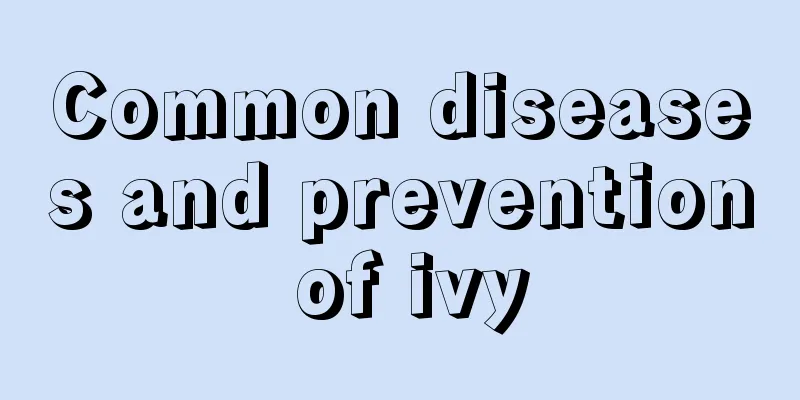Common diseases and prevention of ivy

Ivy Diseases - BlightSymptomsWhen the disease occurs, all or most of the leaves turn brown and rot, or the base of the stems and tender nodes become dark green and water-soaked. The plant gradually becomes soft and shrunken, and the branches and leaves above the diseased part wither. Epidemics are often caused by pathogens in the soil, or by high humidity in the air and a hot and stuffy environment. Once an epidemic occurs, it will spread rapidly. Prevention and treatment methodsRemove diseased plants promptly if found and control watering appropriately. When planting, choose disease-free plants and disinfect the soil before use. Usually, you should strengthen maintenance, pay attention to ventilation and light transmission, and block rain in time when it rains to avoid the soil in the pot from becoming moist and moisture being retained. Spray pesticides in time for prevention and control: In the early stage of the disease, spray or water 800 times diluted 25 % metalaxyl wettable powder or 600 times diluted 58 % metalaxyl . mancozeb wettable powder. There are many options, just buy them in the market. Ivy Diseases - Botrytis CinereaSymptomsWhen the disease occurs, water-soaked brown or black spots appear on the edges of the leaves. In severe cases, the spots may occupy most or all of the leaves, and a gray mold layer will form when it is humid. Prevention and treatment methodsUse disease-free new soil for planting, control watering, and do not apply too much nitrogen fertilizer. Remove diseased leaves promptly and burn them. When the disease occurs, spray 500 times diluted 75 % thiophanate-methyl. Once every 10 days, 2 to 3 times in a row. Ivy Diseases - Leaf SpotSymptomsIn the early stage, only small circular dark spots with oily halos appear on the leaf surface. Later they expand and become black, some become polygonal, and occasionally ulcer spots appear on the petioles. Leaf spot disease is serious, highly contagious, prone to recurrence and difficult to cure. Prevention and treatment methodsChoose disease-free mother plants for breeding. Also, be sure to identify the store when purchasing. Don't buy a diseased plant, which will not survive no matter how you remedy the situation. In the early stage of the disease, spray 3000 times diluted streptomycin sulfate or 600 times diluted 12 % green copper emulsifiable concentrate, or 500 times diluted 20 % Longke bacteria suspension. Ivy Pests - Scale InsectsSymptomsMany flower lovers have seen scale insects. From a distance, there will be many small white spots on the plants, which affects the appearance. But in the later stage, the scale insects will wreak havoc on the leaves, causing the leaves to turn yellow and the plants to wilt. In severe cases, the entire plant will die. Scale insects leave wounds on leaves, which are easily infected by bacteria and cause diseases. Prevention and treatment methodsIn the early stage, there are fewer pests and they can be scraped off manually. If large-scale diseases are found in the later stage, spray 800 times the diluted 40% oxydemeton-methyl emulsifiable concentrate. |
<<: Disease prevention and control of desert rose
>>: Disease control of white butterfly
Recommend
How to grow poinsettia to make it red
Poinsettia Growing Conditions Poinsettia is a sho...
Cultivation methods and precautions of Pansy
1. Lighting It likes light, and during the breedi...
Camellia planting methods and precautions
When to plant camellia Camellia can be sown in Ap...
Can jackfruit be grown in Guangxi?
Can jackfruit be grown in Guangxi? Jackfruit requ...
Can Clivia be watered with white wine? Is it true that it can be watered with white wine?
1. Can I pour white wine? Regarding the nutrients...
Does germination rate of succulent leaf cuttings in winter increase?
The variety also determines the germination rate ...
Cultivation methods and precautions of purple root orchid
1. Breeding methods 1. Flower soil: It is afraid ...
Can I put Aspidistra in the bedroom?
1. Purify the air We all know that it can make th...
The role and efficacy of peaches
1. Diuretic Peaches contain phenol, which can act...
Four-season Begonia cultivation methods and techniques
Begonia is one of the ornamental plants loved by ...
How to grow ginger to get high yield?
Ginger has strong adaptability and can be found g...
How often should carnations be watered?
1. How often should you water? 1. When just plant...
Can potassium dihydrogen phosphate be used to care for young Clivia seedlings in winter?
1. Winter maintenance methods for seedlings 1. Te...
Black grass cultivation methods and precautions
Growth habits of black grass Black seed grass is ...
Can spinach continue to grow if the stems and leaves are cut and the roots are left?
Spinach is a very resilient vegetable that has th...









